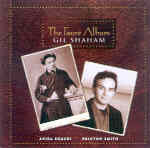Like so many artists today, Gil Shaham finds himself at the top of his form but with no major label outlet for his talents. Happily he has had the vision and smarts to find a way to create his own imprint, Canary Classics, in association with the reborn Vanguard label, and we can only hope that we will be hearing from him regularly. As these performances clearly reveal, he has a lot to say in this music, and the entire program has been well chosen to appeal both to “serious” classical music fans and to those who enjoy shorter or less challenging fare.
First, the serious stuff: Shaham and pianist Akira Eguchi turn in an impressive performance of the First Violin Sonata, one quite different from the aristocratic classic Grumiaux recording on Philips. Here the work’s roots in Beethoven’s own contributions to this medium come to the fore, most tellingly in the punchy scherzo and sharply delineated rhythms of the outer movements. The Andante, in contrast, sings with true Romantic ardor. It’s a lovely performance, as is that of the late and comparatively elusive Piano Trio, where the duo receives handsome assistance from cellist Brinton Smith, and all concerned bring a welcome degree of freshness and energy to a work that in other hands tends to languish.
Eight shorter pieces fill out the program, including a charming transcription by Eguchi of Après un Reve, the inevitable “Sicilienne” from Pelleas et Melisande, and two more substantial offerings: Romance Op. 28, and the Andante Op. 75. Coming as they do between the two larger works (save for the Eguchi transcription, which closes the program as an “encore”), the entire disc offers a welcome variety of material that truly adds up to a “Fauré Album”, exactly as promised. There is, however, one problem: the sonics are very forward, really too close to the players, and Shaham is a heavy breather, to the point where his gasping really does get in the way of the music on more than one occasion. Difficult though it may be, he should get this under control as well as back off from the microphones a bit. It would be a shame to let this single extra-musical consideration ruin the enjoyment of so much excellent music-making.
































